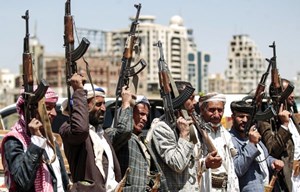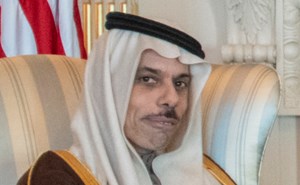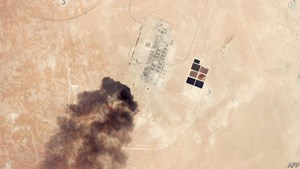Yemen rebels rebuff Saudi Arabia’s latest cease-fire proposal
(Bloomberg) --Saudi Arabia proposed on Monday a series of steps to end the years-long war in Yemen, including a comprehensive cease-fire to begin once Iran-backed Houthi fighters accept the initiative. Yemen’s Houthis appeared to reject the plan.
The proposal comes after an escalation in drone and missile attacks by the Houthis on the energy and security infrastructure of the world’s largest oil exporter. The Houthi offensive, including an assault on a major Saudi Aramco refinery in the capital Riyadh on Friday, has raised concerns over the risk of a broader conflagration in a region key to crude production and shipment.
U.S. President Joe Biden has vowed to end the conflict in Yemen, ceasing sales of offensive weapons to Saudi Arabia, removing the Houthis’ terrorist designation to facilitate the delivery of humanitarian aid, and pushing for a negotiated settlement.
As well as a comprehensive cease-fire under United Nations supervision, the Saudi plan calls for depositing taxes and customs revenue from ships carrying oil to Hodeidah port in the joint account of the central bank, the limited reopening of the international airport in the Yemeni capital Sana’a, and the start of UN-mediated peace talks.
“It’s an initiative that gives the Houthis a chance to end the bloodshed,” Saudi Foreign Minister Prince Faisal bin Farhan said in Riyadh. “It will be executed if they announce their acceptance of it.”
A Houthi spokesman immediately downplayed the significance of the announcement, saying anything that didn’t immediately lift the blockade and meet other demands was “nothing new.” There was no immediate comment from the UN which has been intensively pushing a similar plan along with the U.S.
Repeated Efforts
Saudi Arabia has announced repeated unilateral -- but partial -- ceasefires in Yemen since the 2019 attacks in Abqaiq, which have not succeeded in ending Houthi attacks on its own soil or the fighting in Yemen. Peace efforts mediated by the UN and others have also failed to take hold.
Shortly after the Saudi announcement, the U.S. said Secretary of State Antony Blinken had spoken with Prince Faisal about Yemen. The two men discussed supporting UN and U.S. efforts to end the conflict “starting with the need for all parties to commit to a cease-fire and facilitate the delivery of humanitarian aid.”
The Houthis, who UN experts say have received Iranian support and training, have been fighting Yemen’s internationally recognized government since 2014, capturing Sanaa and most of the country. A Saudi-led coalition intervened the following year on the side of the government, imposing a blockade that has contributed to what the UN has called the world’s worst humanitarian crisis.
Fighting has intensified as the diplomatic efforts have gained momentum, however, with the rebels pushing to capture the strategic city of Marib, an energy-producing area and government stronghold. In recent weeks, battles have spread to other areas, including Taiz and Hajjah, where government forces are seeking to make gains.
The uptick in attacks deep inside Saudi Arabia itself also comes as Biden clashes with Iran over how to revive a 2015 accord that was designed to curb the Islamic Republic’s nuclear program. That’s led to claims -- not least from Saudi Arabia -- that Iran is using the Houthis to pressure the U.S. to remove American sanctions.
“Iranian interference is the main cause of the prolonged crisis with Yemen,” Prince Khalid said. “We’ve seen before that the kingdom proposed solutions and cease-fires the Houthis didn’t take the benefit.”
The Houthis claimed three attacks on Saudi energy installations this month, in the most serious escalation since a missile and drone attack on a major processing facility in Abqaiq in 2019 briefly knocked out about half the kingdom’s oil production.
Oil Attacks
The offensive has prompted Saudi Arabia to seek more help from the U.S. and other allies to thwart the near-daily attacks. As well as Friday’s attack on the 120,000 barrels-per-day refinery, the Houthis have also claimed strikes on the world’s biggest oil-export terminal of Ras Tanura and on a fuel depot in Jeddah.
U.S. Special Envoy to Yemen Timothy Lenderking has visited the region twice since his appointment by Biden, and said this month that he’d presented the Houthis with a comprehensive plan to end the war.
The Houthis said, however, that they would not agree to talks unless Saudi Arabia lifts its air and sea blockade and implement a full cease-fire first. The repeated those demands Monday.
“Any stands or initiatives that do not take into consideration that Yemen is under an aggression and blockade for six years, and do not differentiate between the humanitarian aspect and any military or political deal, and do not lift the blockade, are not serious and contain nothing new,” Houthi spokesman Mohammed Abdulsalam said on Twitter.





